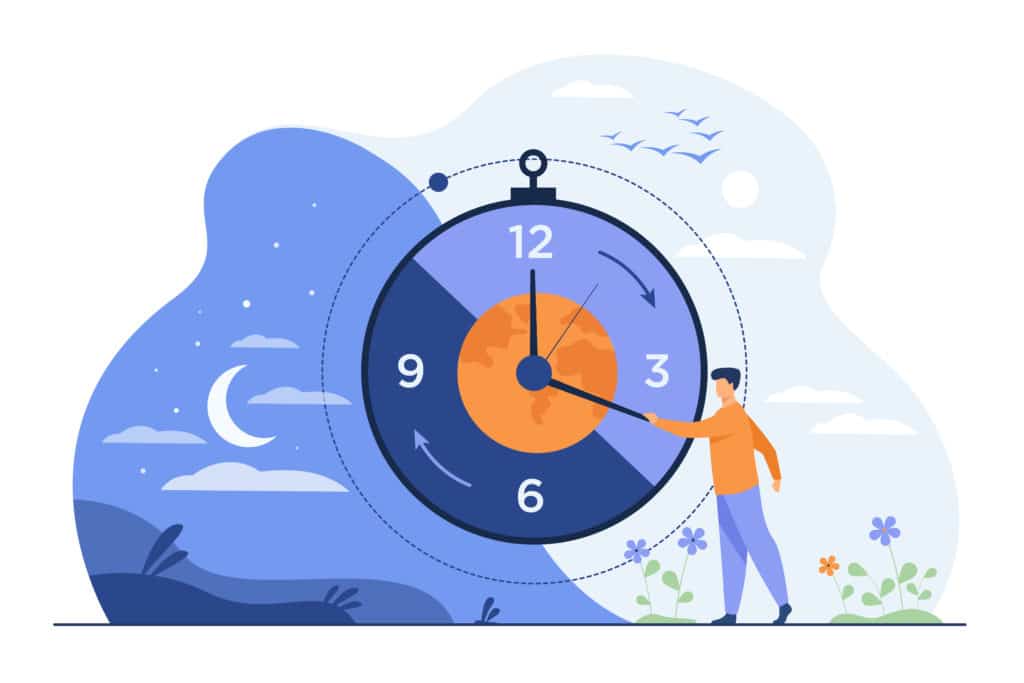
What exactly is circadian rhythm?
The word circadian literally means “about a day”, which makes sense because your circadian rhythm runs roughly on 24-hour cycles. The timing of your circadian rhythm is controlled by a group of cells in your brain that uses cues from the environment to regulate its functioning.
Circadian rhythm disorders
Various factors can make your circadian rhythm go out of sync. Some common causes are aging, travel, shift work, and using digital devices too late at night. An out-of-sync circadian rhythm can lead to a number of different disorders.
Advanced sleep-phase disorder
The early bird catches the worm? Not likely with this sleep disorder. It causes you to fall asleep early in the evening and wakes you up in the middle of the night (2-5am). This can cause you to feel groggy and unpleasant during the day. Advanced sleep-phase disorder typically occurs in older adults and people can either adjust their lives around their schedule or use techniques to realign their sleep-wake cycles.
Delayed sleep-phase disorder
Being a night owl is not always a party! Delayed sleep-phase disorder is when your sleep is delayed by two hours or more beyond what is considered your normal bedtime. This disorder keeps you awake until the early hours of the morning and then causes you to sleep into the afternoon. The disorder is possibly genetic and experts believe many people with this disorder have a circadian rhythm that is longer than 24 hours. There is no known cure but symptoms can be managed with environmental cues like light and routine.
Irregular sleep-wake rhythm disorder
This disorder keeps you from having any consistency to your sleep pattern. Instead of a full night’s sleep each night, you may instead have many naps throughout a 24-hour period. This happens when the functioning of your master clock is limited by damage to the brain, which could be caused by a neurodegenerative disease (such as dementia) or a brain injury.
Non-24 hour sleep-wake disorder
Anyone who is not able to receive light-based environmental cues (such as people who are blind) would see their sleeping hours constantly shifting. Non-24 sleep-wake disorder occurs in 55-70% of completely blind people and some sighted people. With the disorder, your body would still follow daily circadian cycles but your sleep schedule would change by minutes or hours at a time. People with this disorder have a natural circadian rhythm that ranges from 24.1 to 30 hours.
Jet lag disorder
Jet lag is a temporary sleep disorder that occurs when your body is synced to a different time zone than your current environment. This can cause insomnia and reduce your sleep quality. Jet lag disorder usually improves on its own after several days. Learn ways to prevent jet lag or mitigate the impact.
Shift work disorder
Shift-work often consists of working through the night and sleeping during the day. This can make it tricky to sync your sleep-wake cycle with the daily light-dark cycle and can cause major disruptions to your circadian rhythm. Learn ways to cope with circadian rhythm disturbances caused by shift work.
How do I keep a healthy circadian rhythm?
The most important cues are light, so getting ample sunlight (or light exposure through a happy lamp) in the morning and minimizing light exposure in the evenings before bed are the most powerful techniques for keeping a healthy circadian rhythm. Getting around 20 minutes of natural sunlight in the morning is generally the number one recommendation for improving your body’s natural rhythm.
You can also improve your internal clock by keeping a consistent schedule. Eating, sleeping, and exercising close to the same time every day are great techniques to keep things regulated. Maintaining bedtime and morning routines also act as important regulating cues for your sleep-wake cycle.






